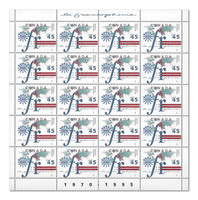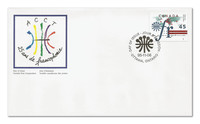| Name |
Value |
| Date of Issue |
November 6, 1995 |
| Year |
1995
|
| Quantity |
15,000,000 |
| Denomination |
45¢
|
| Perforation or Dimension |
13 x 13.5 |
| Printer |
Ashton-Potter Canada Limited. |
| Postal Administration |
Canada |
Use these values to track the value of your stamp collection?
prices in CAD
* Notes about these prices:
- They are not based on catalogue values but on current dealer and auction listings. The reason for this is that catalogues tend to over-value stamps.
- They are average prices. The actual value of your stamp may be slightly above or below the listed value, depending on the overall condition of your stamp. Use these prices as a guide to determine the approximate value of your stamps.
Pane of 25 Stamps
Quantity Produced -
Unknown
Official First Day Cover
Quantity Produced -
Unknown
Official First Day Cover - Plate Block
Quantity Produced -
Unknown
On November 6, 1995, Canada is issuing a stamp to honour the 25th anniversary of the founding of the Agency for Cultural and Technical Co-operation (ACCT). This organization is the forerunner of La Francophonie, the French-speaking world's equivalent to the Commonwealth. La Francophonie has two meanings. The first is the association of peoples who speak or use the French language. Historically, this group of nations is not as close-knit as the Commonwealth, not having all been colonies of France, as are Commonwealth nations with Great Britain. In fact some are members of both organizations, like Canada and the small island nations of Mauritius and Vanuatu. La Francophonie also refers to a collective of groups and associations, both private and governmental, engaged in activities of mutual interest and seeking to maintain a co-operative dialogue within which the French language is instrumental. The Agency for Cultural and Technical Co-operation (ACCT) is the cornerstone of La Francophonie. Its main goal is to foster solidarity between industrialized and developing nations through the use of the French language. It comprises 37 member states, five associated states, and the two participating governments of Quebec and New Brunswick. Closer ties between French-speaking nations began to appear with the emergence of new countries following the decolonization of former French and Belgian territories. However, it wasn't until 1968 that initial discussions began to formulate the concept of La Francophonie. It was on March 20, 1970 (now celebrated worldwide as International Francophonie Day) that ministerial delegates from 21 nations - including Canadian representation from Quebec, Ontario, New Brunswick and Manitoba - met in Niamey, Niger to found ACCT. The Agency's first Secretary-General was Quebec journalist Jean-Marc Léger. Membership has always been rather loosely structured, generally made up of countries that attend the biennial Francophonie Summits. Attendance is by invitation from the host nation or through application to either the host or ACCT. More formal rules are scheduled for adoption at the Cotonou Summit in Benin this December. Canada enjoys unique membership in La Francophonie in that while being a member nation, the provinces of Quebec and New Brunswick are participating governments. To maintain the principle of federal sovereignty in foreign affaires, Quebec participates fully in matters of co-operation at Summits but is only an "interested observer" in political and economic aspects. There are two standing ministerial conferences - the Conference of Ministers of Education (CONFEMEN) and the Conference of Youth and Sports Ministers (CONFEJES). The goal of CONFEMEN is to advance and evaluate educational policies. That of CONFEJES is to promote and protect youth. It is also responsible for organizing the Francophonie Games which saw 39 countries competing in the inaugural games in Morocco in 1989. The third Games are scheduled for Madagascar in 1997. Non-governmental agencies include the International Association of French-speaking Parliamentarians and the Association of Partly or Wholly French-speaking Universities, founded by Canadian Jean-Marc Léger and headquartered in Montreal. Canada has put forth and supported many achievements in the nine priority sectors of the Summits: agriculture, energy, environment, culture and communications, scientific and technological data, university research, legal, education and economic development. The Office of the Federal Co-ordinator for La Francophonie, within Foreign Affairs and International Trade Canada manages our participation. Of the 44 member states, 38 are developing countries. Some 35 members receive Canadian aid as over $40 million is allocated annually to La Francophonie.
Designed by Alain Leduc.
Canada Post Corporation. Canada's Stamps Details, Vol. 4, No. 6, 1995, p. 16-18.
Did you notice an error in this stamp's information?
Do you have any interesting information about this stamp that you would like to share?
Please
click here to send us an email with the details.



